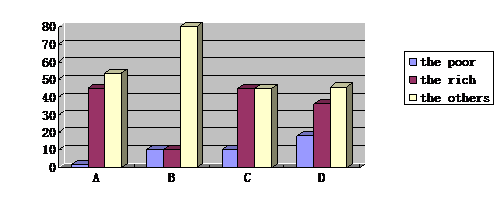题目内容
A survey of the opinions of experts ________ that three hours of outdoor exercise a week is good for one's health.
- A.show
- B.shows
- C.showed
- D.showing

In New Britain, Connecticut, a new official in charge of schools named Kelt Cooper wants to end high truancy (逃学) rates among public school students, and he’s suggesting financial punishments to get job done. A plan to fine students up to $75 for each day they skip school is now being considered by New Britain authorities.
The concept of fining kids for skipping school may come as a shock, but it’s not new. In Ohio, the parents responsible for a student guilty of habitual truancy can be fined up to $500 and/or be required to perform up to 70 hours of community service. Until recently, students in Los Angeles could be hit with a $250 punishment for each count of truancy; in early 2012 the law was changed and the heavy fines were removed, though a $20 punishment may still be handed out if a student truants for the third time.
Fines for truancy are also in effect overseas. In the UK, The Guardian reports, parents can be fined £50 (about $80) per skipped school day. The punishment doubles if it’s not paid within 28 days.
The question is: Do fines like this work? The vast majority of authorities in the UK said that, indeed, they do. The fines were believed either “very successful” or “fairly successful” by 79% in reducing truancy, according to a survey.
If the plan is passed in Connecticut, it’s unclear how effective the law might be, how to make parents and students obey the law and what might happen if they refuse to pay. However, local officials seem to be willing to give it a shot. According to the Hartford Courant:
“The mayor agrees that truancy is a real issue in New Britain schools, and what’s been done in the past hasn’t been working to reduce truancy.” said Phil Sherwood, assistant to Mayor Timothy O’ Brien.
And what do the students think? In the New Britain Herald, one 17-year-old entering her senior year called the plan “ridiculous” and predicted that the punishments will bring about negative effects on the court system. Besides, “I don’t see the point,” she said. “Kids will just try harder not to get caught.”
【小题1】 The passage mainly discusses whether __________.
| A.schools have the right to punish students |
| B.authorities should consider protecting kids |
| C.students should be fined for skipping school |
| D.parents are responsible for children’s truancy |
| A.two hundred pounds | B.fifty pounds |
| C.eighty pounds | D.a hundred pounds |
| A.truancy is a serious problem in New Britain |
| B.Cooper’s plan has been passed in Connecticut |
| C.fining kids for truancy is a new idea in America |
| D.little has been done to reduce truancy in New Britain |
| A.get used to it | B.help improve it |
| C.try to carry it out | D.fight against it |
About 90 percent of Chinese believe the polarization(分化) between the rich and poor is “serious” in China, according to a survey conducted by China Youth Daily. And more than 80 percent of the respondents(对象) surveyed said something must be done to narrow the expanding gap between the rich and poor, while 14.1 percent said it was necessary.
The polarization has aroused wide concern among the public in recent years. The State Development and Reform Commission(国家发改委) said the Gini Coefficient had reached 0.47 for China, up from o.29 two decades ago. Usually, a country with a number above 0.4 is warned to pay attention to the income inequality problem.
To find out the people’s view, the survey covered 10,250 respondents, between the ages of 20 and 30 with a college education and a monthly salary between 1,000 and 3,000 yuan. Surprisingly, most disagreed with the view of experts who claim the urban-rural difference is causing the widening gap. More than 70 percent of the respondents believed that “ the group of special interests” is the prime reason for the polarization, followed by “people in power” 68 percent, and “bosses” 50 percent.
Another unexpected finding is that almost all agreed that a good educational background and knowledge were not the decisive factors in gaining wealth. About 95 percent said rich people are not necessarily those who are able to speak English or have a college education.
Today in China, rich people , accounting for 10 percent of the population, control 45 percent of the total social fortune, and poor people, also 10 percent of the population, only control 1.5 percent, according to an investigation published by the National Bureau of Statistics last June.
【小题1】 It can be inferred that the Gini Coefficient ( in paragraph 2) would probably be _____.
| A.the unit used in advanced mathematics |
| B.the degree of a country’s development |
| C.the level of the citizen’s living standard |
| D.a measure of income inequality |
| A.the urban-rural difference | B.the group of special interests |
| C.the people in power | D.the bosses |

【小题4】What’s the best title of the passage?
| A.Close the Gap between the Rich and Poor |
| B.Surveys conducted by China Youth Daily |
| C.Higher education, Higher pay |
| D.Rich-Poor Divide Serious, Study Finds |
